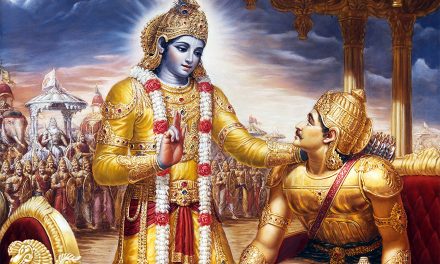na ca śreyo ‘nupaśyāmi
hatvā sva-janam āhave
na kāńkṣe vijayaḿ kṛṣṇa
na ca rājyaḿ sukhāni ca
Translation of Bhagavad Gita 1.31
I do not see how any good can come from killing my own kinsmen in this battle, nor can I, my dear Krishna, desire any subsequent victory, kingdom, or happiness.
Commentary by Sri A.C. Bhaktivedanta Swami Prabhupada of Gaudiya Sampradaya:
Without knowing that one’s self-interest is in Vishnu (or Krishna), conditioned souls are attracted by bodily relationships, hoping to be happy in such situations. In such a blind conception of life, they forget even the causes of material happiness. Arjuna appears to have even forgotten the moral codes for a kshatriya. It is said that two kinds of men, namely the kshatriya who dies directly in front of the battlefield under Krishna’s personal orders and the person in the renounced order of life who is absolutely devoted to spiritual culture, are eligible to enter into the sun globe, which is so powerful and dazzling. Arjuna is reluctant even to kill his enemies, let alone his relatives. He thinks that by killing his kinsmen there would be no happiness in his life, and therefore he is not willing to fight, just as a person who does not feel hunger is not inclined to cook. He has now decided to go into the forest and live a secluded life in frustration. But as a kshatriya, he requires a kingdom for his subsistence, because the kshatriyas cannot engage themselves in any other occupation. But Arjuna has no kingdom. Arjuna’s sole opportunity for gaining a kingdom lies in fighting with his cousins and brothers and reclaiming the kingdom inherited from his father, which he does not like to do. Therefore he considers himself fit to go to the forest to live a secluded life of frustration.
Commentary by Sri Vishvanatha Chakravarthi Thakur of Gaudiya Sampradaya:
I do not see any benefit in killing in this manner (na sreyo pasyami). The scriptures say such things as:
dvav imau purusau loke surya-mandala-bhedinau parivrad yoga-yuktas ca rane cabhimukhe hatah
The sannyasi engaged in yoga and the warrior who dies facing the enemy attain the sun planet. Parasara Smrti 3.30
Thus it is better that one die rather than kill them, as there is no piety in this killing.
“But by fighting you gain kingdom and fame.” “I do not desire victory, kingdom or happiness.”
Commentary by Sri Ramanuja of Sri Sampradaya:
1.26 – 1.47 Arjuna said — Sanjaya said — Sanjaya continued: The high-minded Arjuna, extremely kind, deeply friendly, and supremely righteous, having brothers like himself, though repeatedly deceived by the treacherous attempts of your people like burning in the lac-house etc., and therefore fit to be killed by him with the help of the Supreme Person, nevertheless said, ‘I will not fight.’ He felt weak, overcome as he was by his love and extreme compassion for his relatives. He was also filled with fear, not knowing what was righteous and what unrighteous. His mind was tortured by grief, because of the thought of future separation from his relations. So he threw away his bow and arrow and sat on the chariot as if to fast to death.
The Supreme Lord Krishna, Hrsikesa, the master of the senses. The Supreme Controller, internally and externally of all living entities evolving and evolved. Who although the Supreme Lord of all, yet descended down to Earth out of His causeless mercy for the redemption of the faithful and even more, He condescended to be Arjuna’s chariot driver, carrying out his wish to station their chariot in such a commanding position as to be able to readily view the belligerent Kauravas and put within the range of his vision such heroes as Bhishmadeva, Dronacarya and Kripa and the Kings of royal dynasties. At that time the Supreme Lord Krishna said to Arjuna: see what chances there are for the Kauravas victory over thee.
Commentary by Sri Sridhara Swami of Rudra Sampradaya:
Sri Sridhara Swami did not comment on this sloka.
Commentary by Sri Madhvacharya of Brahma Sampradaya:
Sri Madhvacharya did not comment on this sloka.
Commentary by Sri Keshava Kashmiri of Kumara Sampradaya:
Here Arjuna exclaims that he cannot foresee any benefit from slaying his own kinsman in battle. In the Vedic scriptures it is revealed that in this world 2 types of living entities are automatically granted entrance to the heavenly planets: one being the renunciate who is disciplined in the practice of yoga and the other is the warrior slain in battle. So Arjunas arguement is that although there is provision for the slain, there is no declaration of any merit for the slayer.0
Commentary by Sri Adi Shankaracharya of Advaita Sampradaya:
1.31 Sri Sankaracharya did not comment on this sloka. The commentary starts from 2.10.
Commentary by Sri Abhinavagupta of Kaula Tantra Sampradaya:
1.30 – 1.34 Na ca sreyah, etc., upto mahikrte. Those who are wrongly conceived as object of slaying, with the individualizing idea that ‘these are my teachers etc.’8 would necessarily generate sin. Similarly, the act of slaying even of those deserving to be slain in the battle-if undertaken with the idea that ‘This battle is to be fought for the apparent results like pleasures, happiness etc.’- then it generates sin necessarily. This idea lurks in the objection [of Arjuna]. That is why a reply is going to be given [by Bhagavat] as ‘You must undertake actions simply as your own duty, and not with an individualizing idea.
Sanskrit Shloka Without Transliteration Marks:
na ca sreyo ‘nupasyami
hatva sva-janam ahave
na kankse vijayam krsna
na ca rajyam sukhani ca
Sanskrit to English Word for Word Meanings:
na — nor; ca — also; śreyaḥ — good; anupaśyāmi — do I foresee; hatvā — by killing; sva-janam — own kinsmen; āhave — in the fight; na — nor; kāńkṣe — do I desire; vijayam — victory; kṛṣṇa — O Kṛṣṇa; na — nor; ca — also; rājyam — kingdom; sukhāni — happiness thereof; ca — also.







